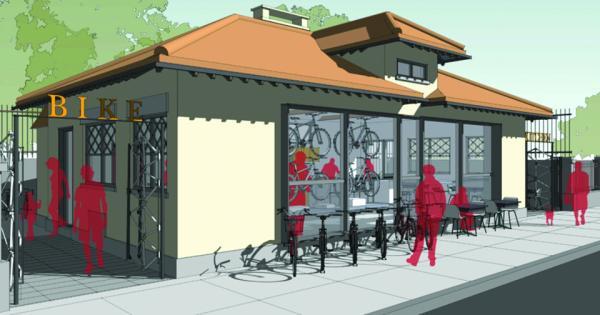August 11, 2016

A rendering shows the latest design plans for the former comfort station in Uphams Corner.
Nestled beneath towering trees beside the Dorchester North Burying Ground sits a small, gray-sided building once used to shelter riders awaiting the next streetcar along Columbia Road. The streetcars no longer come by, but if plans work out, the long-abandoned Uphams Corner Comfort Station will retain an element of its transportation legacy by opening up anew as the Sip & Spoke Bike Kitchen, a neighborhood hub for cyclists, coffee fans, and community members alike.
The business model is two-fold at present: A cafe serving coffee and a range of food will share the space with a full-service bicycle shop that will offer retail sales of new and refurbished bicycles and parts, new accessories, and maintenance and repair services.
Bowdoin-Geneva native Noah Hicks and his team have been work-shopping the bike kitchen for more than a year. An avid cyclist and advocate for transportation equity, Hicks founded and runs the Bowdoin Bike School on Southern Avenue, which offers classes and repairs for free or at a low cost.
“This is the next step,” Hicks told a small group assembled in the Strand Theatre on Aug. 4. The bike kitchen idea has been a dream of his for some time, he continued, “bringing a cafe and bike shop to Uphams Corner, combining my love for bikes with somebody else’s love for place-making and coffee and delicious food and tidbits.”
Kristina Jackson, currently a barista at Fleck Coffee in Newton, will manage the caffeinated subset of the operation.
Along with providing a community gathering spot for an area badly in need of such venues, the revamped comfort station will “source local products, hire homegrown baristas and bicycle technicians, and support the local biking culture in an area of the city where many rely on the bike as an affordable means of transportation that is faster than walking and cheaper than a car,” according to the Sip & Spoke website.
The team has in mind a transformation as the day goes from afternoon to the evening, from bikes and coffee to a low-key bike commuter lounge where open mics, musical performances, and some more adult beverages would be in order.
“We’re not going to be a bar,” Hicks said, “but we do want to be a cultural feature of the neighborhood.” Proximity to the Strand could be a boon for both the shop and the theatre, he said, noting that “at night on 9 o’clock on a Thursday, I want to go some place and have a beverage and a bite to eat. I don’t really have very many options.”
The team will be applying for one of the five remaining subsidized beer and wine licenses available through the neighborhood-designated liquor license program as well as an entertainment license. Hicks said the shop’s finance model is sustainable without incorporating the liquor license should it come down to that, but the small neighborhood crowd gathered for the update seemed supportive of the pitch.
“If you’re wondering about the schedule, we’re also wondering about that,” said Lisa Lewis, senior project manager with development partner Historic Boston, Inc. Her organization and the American City Coalition plan to purchase the 1912 comfort station from the city and are working with Hicks to flesh out a business plan for the bike kitchen. “It’s a bit tricky with the permitting process,” Lewis said, but the team has been hoping for an early 2017 opening.
The developers are applying for a zoning variance, she explained, because the building is included in the burying ground property, so it is currently zoned as “open space/cemetery,” precluding its use as a retail/restaurant site. A zoning board hearing is scheduled for Sept. 13, she said.
All told, the space represents about a $900,000 investment, supported in part through fundraising, grants, and tax credits. An Indiegogo crowdfunding campaign pulled in $18,732 from 238 backers. The team is still working on fundraising directly through their website, sipandspoke.com.
Nick Barnes of Utile Architecture & Planning said the space will be opened up a bit and designed to maximize the light inside the 1,200-square foot building. Balancing the coffee and cycling spaces is key, he said, “having them together but also having the separation so that nobody’s worried about getting axle grease in their espresso.”
Villages:
Topics:


